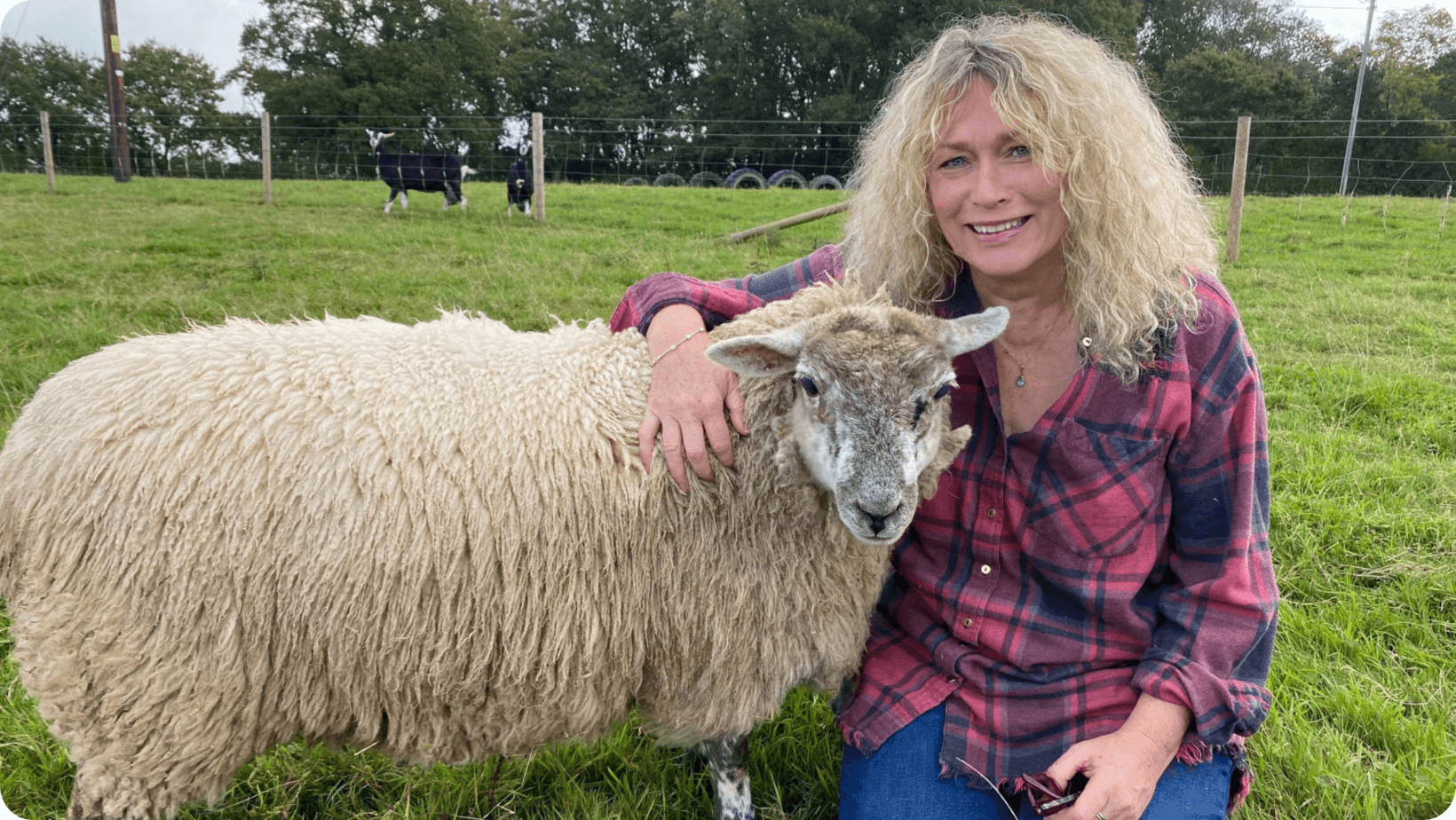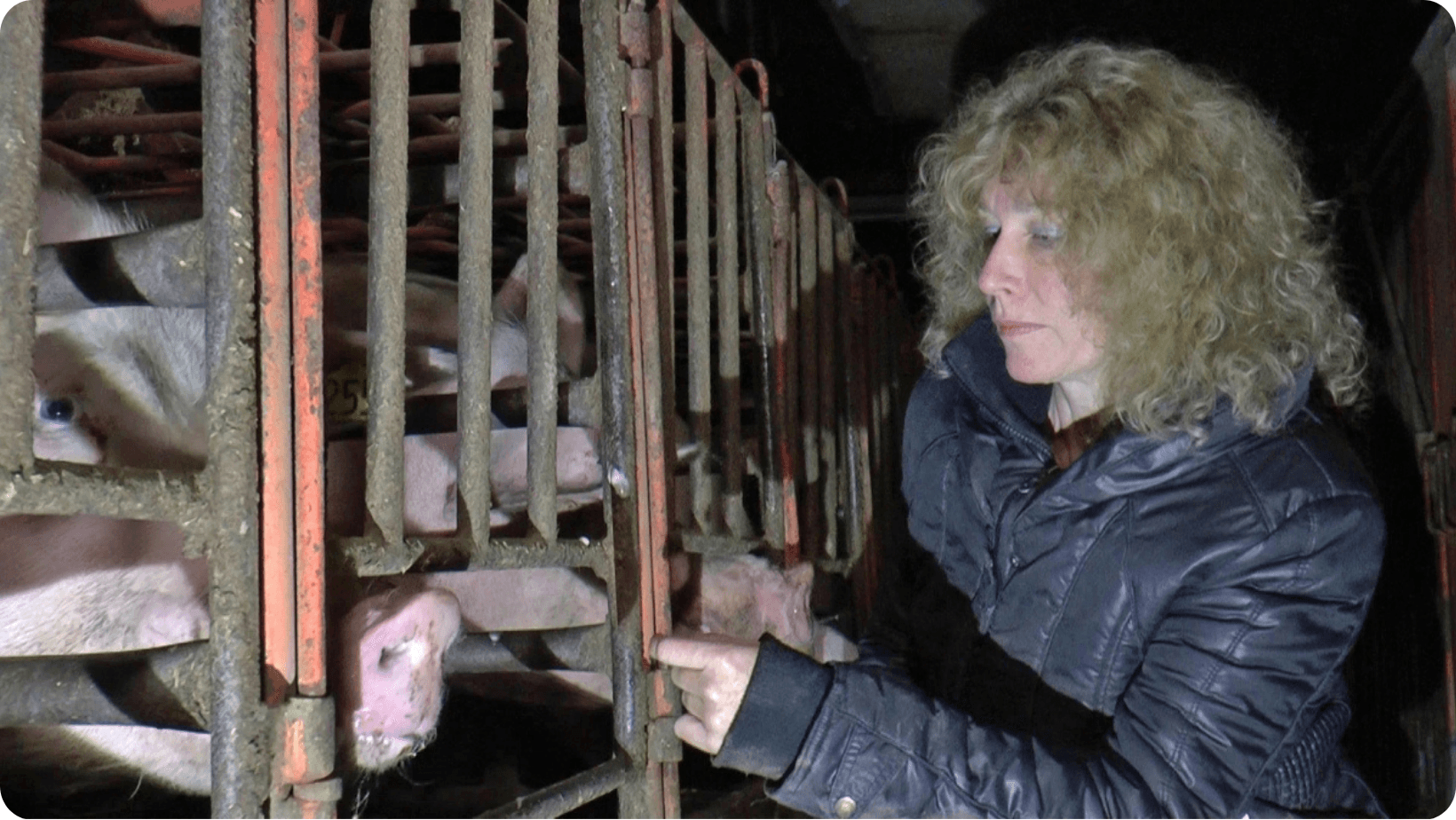Juliet Gellatley on her crusade to end factory farming in the UK
Factory farming was first introduced in the UK in the 1940s. Sadly, this intensive farming method has become the status quo year by year, with approximately 85% of farmed animals now confined to factory farms across the country.
We sat down with Viva! Founder & International Director Juliet Gellatley, to learn what it’s like as an animal rights activist exposing the truth behind factory farming.
Juliet founded Viva! in 1994 with the aim of making the world a kinder place for humans and animals alike, and found that in terms of scale, the most cruelty that is inflicted upon animals happens in factory farms and slaughterhouses. Juliet shares how Viva! desires to shut down both.
V-Land UK (V-L): Your journey has been truly inspirational, please share where it all began, and the defining moment in your life that drew you to the animal rights movement.
Juliet Gellatley (JG): I’ve been a passionate vegan for well over 30 years now, and it all started as a teenager when I visited a factory pig farm. I was appalled to see hundreds of these beautiful, bright, pregnant sows crammed into tiny, filthy metal stalls. I made eye contact with one of the huge boars (kept in the same shed for breeding), he was in a bad way and clearly in pain. I was so overwhelmed at the thought of this intelligent, pleading animal spending his entire existence in a complete hovel, not knowing that he was one day going to be killed and eaten, and it shook me to my core.
I went vegetarian there and then, and veganism followed once I discovered the cruelty of the dairy and egg trades. Visiting that farm was a defining moment in my life; it forever changed me as a person. I could no longer just go about my day, knowing that millions of animals were suffering in conditions deemed ‘legal.’ I knew I had to do something. After visiting that first factory farm, I made it my mission to visit as many as possible, so I could show other people where their food was really coming from.
There is a huge misconception that the British animal farming industry is wholesome and idyllic, and I’ve discovered that it is quite the opposite, with helpless animals trapped in dirty, confined spaces. Disease and violence towards animals are widespread, and the animals are sent to slaughter at very young ages, with many of them never getting to go outside. It’s a shameful industry, and I have made it my personal mission to educate as many people as possible about how animal agriculture truthfully operates.
V-L: How did Viva! come to be? What challenges did you face when founding a charity?
JG: Viva! was launched in 1994, after I left my job at the Vegetarian Society. I wanted to launch my own charity that would focus on exposing factory farming, and banging the drum for farmed animals and veganism. l set up Viva! in my garage; it's crazy to see how much it’s grown, as we now have a large office in central Bristol with about 30 staff! In the 1990s, vegetarianism was becoming mainstream - but veganism definitely not! - so I had the task of popularising a lifestyle that was misunderstood and labelled ‘extreme.’ Not an easy feat.
When we first launched, there were obvious initial challenges, such as cash flow issues, and the typical problem of not having enough hours in the day. I was fortunate enough to get in contact with Audrey Eyton, a wonderful woman who had devastatingly lost her son. He had been an animal rights activist before he passed away, so she ended up working closely with Viva! and donating money to get us off the ground. I’ll forever be grateful for her support.
Another unique challenge I faced was getting access to factory farms, so that I could document what was taking place. Unsurprisingly, farmers aren’t so keen on letting people come and see the animals who are living miserable lives. So, I had to find ways of gaining access to the farms. I once convinced a farmer to let me inside the barn and sneakily took footage when he wasn’t looking. Once his boss realised what I was doing, a chase scene ensued. It was very much like something from a film!
V-L: Did you envision Viva! becoming the leading campaigning charity for animal rights in the UK?
JG: I always aimed to operate at a serious level to progress veganism, and it’s an honour for Viva! to now be so well recognised. Viva! is a team of highly motivated people who are determined to save animals and our planet. It seems odd now to think that I was the first person to campaign for vegetarianism in the UK in my career before Viva!, and then to spend decades campaigning for veganism, but it’s a nice full-circle moment to see that the work is paying off. Veganism really has become much more mainstream and it is common to see vegan menus in restaurant chains.
Viva! doesn't receive any government grants, so our work is entirely dependent on support from our donors, legacies, and supporters. We have a loyal supporter base, some of whom have been with us since the start. Of course, for me, it’s all about the animals.
I won’t stop until every farmed animal is free, and wildlife is no longer under threat from animal agriculture, that is what motivates me to keep going.

Viva!
V-L: Which campaign has affected you the most and why?
JG: I’ve been to countless farms since I launched Viva!, but one that really sticks with me is Hogwood pig farm, which supplied Tesco and was Red Tractor-approved at the time. I was aghast at the awful conditions these poor pigs were subjected to at this horror farm, so much so that we visited four times between 2017 and 2019. Heartbreakingly, pigs at Hogwood were being beaten, were resorting to cannibalism out of desperation and were surrounded by the decomposing corpses of their brothers and sisters. If it sounds like something out of a horror film, that’s because it was.
I was so appalled at seeing how these pigs were being treated at a so-called 'high welfare’ farm, but what was more disturbing to me was how little the corporations cared. It took months of campaigning before Red Tractor or Tesco dropped the farm.
It was incredibly frustrating knowing that pigs were being abused, but no one was willing to do anything about it. Eventually the farm was dropped by Tesco and Red Tractor, but it took constant dedication from our team. We made a film about the farm and our struggle to make the world care; Hogwood: A Modern Horror Story is available to stream now on Amazon Prime and Netflix.
V-L: You’ve spoken on multiple platforms, from Vegan Camp Out to being interviewed by Piers Morgan. What advice would you give anyone advocating for animals in the public eye, and what challenges/resistance might they need to prepare for?
JG: Advice that I give to everyone appearing in the media, is to have one key opening statement that summarises everything you want to get across in the interview. Interviews tend to go off on a tangent - and certain interviewers will try to lead you away from the topic at hand - but if you have a well-thought-out opening statement that you can always come back to, you’ll feel a lot more relaxed. It’s also helpful to have some key, up-to-date stats that can back up your viewpoint.
For example, I always make sure I’ve got key information about the number of animals living in factory farms, the impact it’s having on our climate/health, and how many vegans there are. I get asked variations of these questions almost every time, so having relevant data is an excellent way of backing up my point.
Finally, stay calm. There are journalists who will try to catch you out, particularly if they disagree with what you’re saying (Piers Morgan, I’m looking at you!). If you can remain calm, that’s half the battle. The audience will find it much easier to understand you if you take your time and answer with the facts, as opposed to letting emotions rule you.
To state the obvious, always remember you’re talking to the audience, not the interviewer, they are just a conduit. Easier said than done, but a useful pointer if you ever come across a stubborn interviewer!

Viva!
V-L: Viva! is renowned for honest and impactful campaigns, showcasing the truth behind animal welfare here in the UK. Do you feel a shift towards a wider awareness towards animal equality?
JG: Since I launched Viva! in 1994, there’s been a colossal shift in the way people view veganism. In the 1990s, veganism was viewed as radical with very few food options at restaurants. Now, you can walk into any chain in the UK and get a vegan option - and it’s not all bean burgers and falafel salads either! However, there’s still a long way to go.
While veganism is becoming more widespread, there’s still a lot of misunderstanding around factory farming and slaughter. It’s easy to fall for the meat industry’s false narrative that animals live wholesome lives and have peaceful deaths, because believing their lies is convenient.
Researching and understanding the truth about factory farms and slaughterhouses is incredibly hard, both mentally and because these institutions operate behind closed doors. That’s why Viva! does so many undercover campaigns, and it’s why I recently appeared in Joey Carbstrong’s excellent documentary Pignorant. The documentary exposes pig gassing, the widespread method of pig slaughter that takes the lives of approximately 90% of UK-farmed pigs. It’s so important to educate people on how farmed animals live and die just so they can end up on their plates. I believe people are more open to hearing about these practices than they were 30 years ago - but it’s up to all of us to keep spreading the word.
If you’d like to support Viva! and their campaigns you can join here, or to support a Viva! Campaign in person, you can register to volunteer via their website.
For more inspiring interviews within the animal rights movement, check out investing in a vegan future with Veganuary Founder Matthew Glover, or why Ed Winters is compelled to champion vegan activism.
